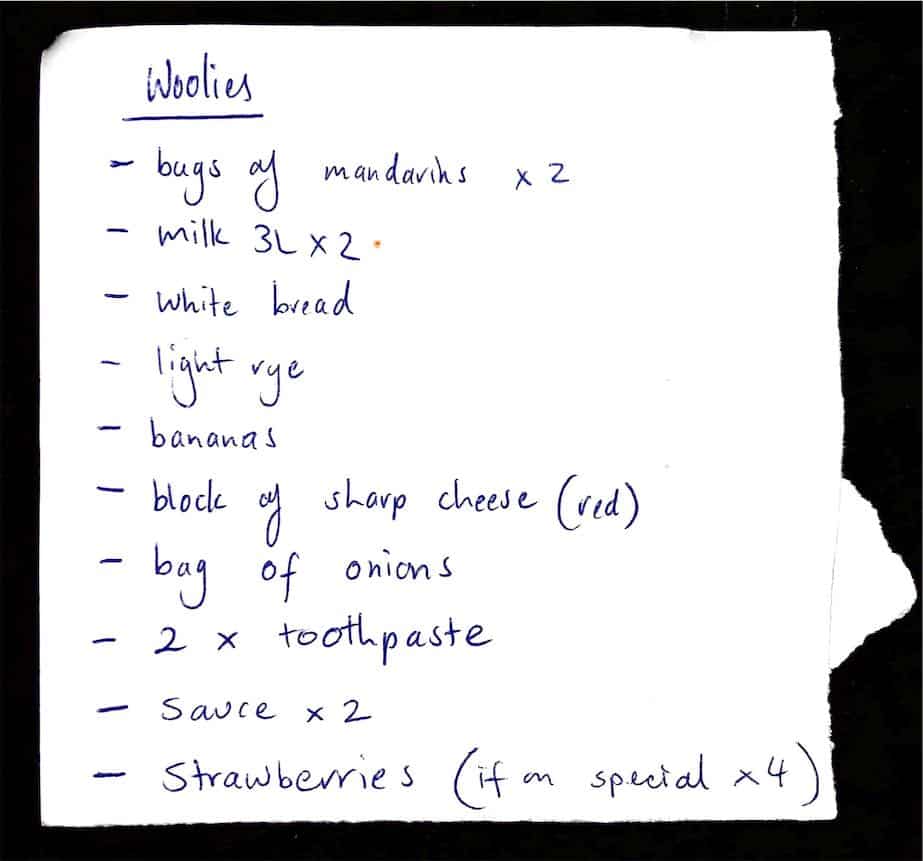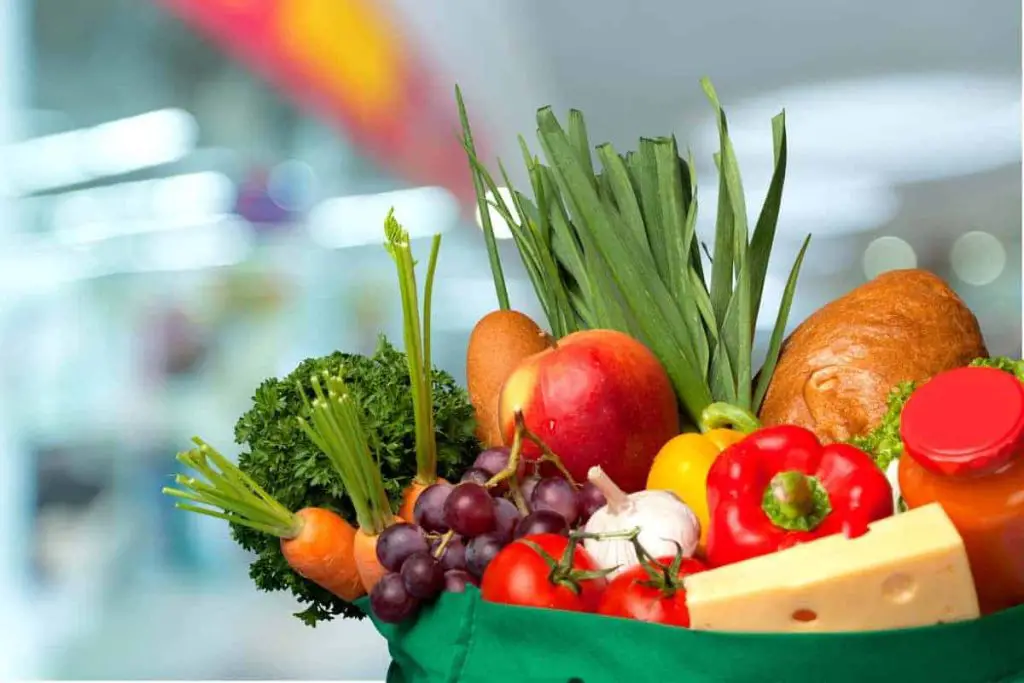If there’s one area within your budget that you can easily save a few dollars every week – it’s your groceries. It can be a very difficult to think outside the box when you want to change your eating habits. We’ve become highly accustomed to eat foods that we enjoy only because we were raised on them.
Not only do we have our tastes competing against our wallet, but we also have more variety and diversity when it comes to food today. The grocery bill can quickly add up as you speed through the aisles in your local grocery store!
In this post we will explore how you can do your groceries on a budget without necessarily compromising much on what you buy today.
Here are three tips to use when it comes to budgeting for your groceries:
- Plan your meals ahead of time (preferably a week)
- Stick to the plan by writing a shopping list (determine what you have and what you need)
- Only buy what you’ve written down on that shopping list
- Bonus tip – don’t go shopping on an empty stomach!
Let’s look into this a little more deeper. I cannot emphasise enough the very first point, it’s my top tip to keep control of your grocery shopping spending on food:
Have a Meal Plan
If you’re not looking to compromise too much when it comes to the brands you purchase then there’s easily one way you can save money on your groceries and that is – plan your meals .
By planning for your meals you know what ingredients you need and from this you’ll then be able to write up a shopping list, as my wife did today for me to go and hunt:

While having a shopping list should prevent you from doing unnecessary purchases, there are some other things that can help you even further:
- Know where to get your items by being familiar with your local grocery store. Every time you enter your local grocery store you should be setting new P.B.’s (personal bests). Quick note – I’ve noticed in recent years that grocery stores change their locations of food items more than what they have in the years before. Is it just me? I often wonder if it’s to make customers walk up and down all the aisles and spot something they “need”.
- Know what the usual price of your groceries costs. Become familiar with what it costs to purchase some of the staple items, such as fruit and vegetables, bread, milk, cereal, pasta, rice (etc).
- Know what you generally spend on a normal grocery run. This can help you when forecasting your budget for the next week or for the month ahead.
- Resist temptations and don’t be afraid to give your children a quick “No” when they ask for Chupa Chups going through checkout, in fact, self-checkouts could be the go if you don’t have a trolley full of items.
How far should you plan ahead?
We have found planning for the week ahead to be the best for our family of five. The further you can plan ahead the more able you will be able to buy in bulk and save more.
And planning isn’t too hard either if you’ve got a couple of signature dishes the family enjoys in certain seasons. For example, we eat big soups that last a couple of meals during winter and in summer we tend to have meals more with garden salad.
In fact, right now I can tell you what’s cooking this week (don’t forget it’s winter here!):
-
Monday
- Enchiladas – this easily feeds our family of 5 and we tend to have leftovers for lunch the next day.
-
Tuesday
- Pasta – again another easy meal to cook that always has leftovers available for lunch the next day.
-
Wednesday
- Chicken tenders and salad – a light meal during the week, but we have apple crumble for dessert afterwards.
-
Thursday
- Risotto – sometimes we may have this with salmon if my wife thinks our brain cell function is lower than normal. As this is cooked with rice we tend to have plenty of leftovers for lunch the next day.
-
Friday
- Home-made pizzas – we do buy the bases and then put minimal toppings on. Great way to end the week! The three kids share two pizza bases and have usually half a pizza leftover, whereas daddy tries to consume a whole pizza and rolls around on the couch for the rest of the night.
-
Saturday & Sunday
- Chicken schnitzel, buy in bulk and you can make enough to last the weekend. You can also cook some for use within sandwiches or make burgers too.
From the schedule above I hope there are a couple of things you spotted:
- Try to create a meal that can provide leftovers for the next day or two. There’s nothing wrong with leftovers, just be sure to pop the food in the fridge overnight and heat again before serving.
- We don’t have dessert every night. This can quickly inflate your budget and your waist if you have something sweet every night – try to limit it to a night or two. We tend to use it as a reward if we want our kids to eat something “healthy”.
And… uh-oh, I’ve raised the h-word.
Whenever you bring together the words “budgets” and “groceries” together in the same sentence it doesn’t take long for somebody to raise the issue of healthy eating. The h-word.
At what price do you cost your health? The price of looking after yourself should never come at the cost of money, but nor should it leave you cold and in the dark because you can’t pay your utility bills.
Yes, I’m a fan of eating organic foods, as this was the Creator’s original intention, to eat from the source, but if organic foods are too expensive then we look at the next best alternative.
Should You Buy Organic Foods?

Again, I’m only going to advocate that you work within your food budget and if you can afford buying organic foods and you want to eat it then by all means go for it.
If you can’t afford to purchase organic foods then don’t get too caught up about it. Sometimes we worry too much on our body that I tend to think the worrying about not eating organic food is what causes us to have problems in the first place rather than the food we eat.
Ok, enough said about that topic, let’s move on to what other groceries we should be looking to buy on your budget.
What are the Best Groceries to Buy on a Budget?
If you’re like us and are a little family of 5 on a grocery budget then the best foods to buy are those that can provide quantity. Look for items such as these:
- Pasta and pasta sauce – don’t go too fancy with the sauce as there are other things we can add to our pasta dish to make it el dente (like cheese).
- Rice – seriously look at learning how to make a killer risotto. Steam some broccolini and you’ve got a winning dish every time.
- Pizza bases – try some with pre-made bases, or get plain bases and make your own bases with tomato paste.
- Wraps – make your own enchiladas or soft burritos!
Conclusion
As you can see with all of these foods they can all be complemented with meats or other vegetables to provide you with a meal at dinner time. If you make enough quantity you can carry over any scraps remaining to the next day for lunch (or for dinner again) – this not only saves you the hassle of having to cook again, but also saves the electricity and gas bills! Win, win!

